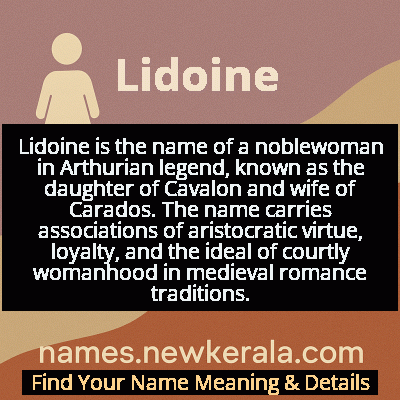Lidoine Name Meaning & Details
Origin, Popularity, Numerology Analysis & Name Meaning of Lidoine
Discover the origin, meaning, and cultural significance of the name LIDOINE. Delve into its historical roots and explore the lasting impact it has had on communities and traditions.
Name
Lidoine
Gender
Female
Origin
Arthurian
Lucky Number
5
Meaning of the Name - Lidoine
Lidoine is the name of a noblewoman in Arthurian legend, known as the daughter of Cavalon and wife of Carados. The name carries associations of aristocratic virtue, loyalty, and the ideal of courtly womanhood in medieval romance traditions.
Lidoine - Complete Numerology Analysis
Your Numerology Number
Based on Pythagorean Numerology System
Ruling Planet
Mercury
Positive Nature
Adventurous, dynamic, curious, and social.
Negative Traits
Restless, impatient, inconsistent, prone to indulgence.
Lucky Colours
Green, white.
Lucky Days
Wednesday.
Lucky Stones
Emerald.
Harmony Numbers
1, 3, 9.
Best Suited Professions
Sales, marketing, travel, entertainment.
What People Like About You
Versatility, charisma, adventurous spirit.
Famous People Named Lidoine
Lidoine of Arthurian Legend
Legendary Noblewoman
Central figure in the Carados romance, exemplifying medieval ideals of womanhood and courtly love
Lidoine (Literary Character)
Fictional Character
Featured in medieval Arthurian continuations as a symbol of aristocratic virtue and loyalty
Lady Lidoine (Modern Retelling)
Literary Character
Reimagined in contemporary Arthurian fiction as a resilient noblewoman
Name Variations & International Equivalents
Click on blue names to explore their detailed meanings. Gray names with will be available soon.
Cultural & Historical Significance
Her cultural significance extends beyond her individual story to represent the interconnected nature of Arthurian genealogy and the transmission of cultural values. Through her familial connections and marital alliance, Lidoine links different narrative traditions and geographical regions within the Arthurian world. The preservation of her character across multiple manuscript traditions indicates her importance in the medieval literary consciousness, serving as a touchstone for discussions of marriage, loyalty, and noble identity in the chivalric world.
Extended Personality Analysis
Lidoine's personality as depicted in Arthurian literature centers on unwavering loyalty and aristocratic grace under pressure. She demonstrates remarkable emotional resilience during her captivity, maintaining her dignity and faithfulness to her husband despite her difficult circumstances. This steadfastness is complemented by a quiet intelligence that allows her to navigate the complexities of court life and personal crisis with equal composure.
Her character exhibits the medieval ideal of the noble wife—supportive of her husband's knightly endeavors while maintaining her own moral integrity. Lidoine represents a balance of traditional feminine virtues with inner strength, showing that passivity in medieval literature often concealed significant moral agency. Her ability to endure hardship without compromising her principles makes her a model of aristocratic virtue, demonstrating that true nobility manifests not just in birth but in character and conduct during times of trial.
Modern Usage & Popularity
Lidoine remains an exceptionally rare name in modern times, primarily confined to academic discussions of Arthurian literature and occasional use by enthusiasts of medieval history. Its absence from contemporary naming databases underscores its status as a specialist choice rather than a mainstream option. The name sees occasional revival in fantasy literature communities and among historical reenactors who value authentic medieval names, but it has never achieved significant popularity. Recent trends toward unique literary names have generated mild interest, though the name's obscurity and challenging pronunciation continue to limit its broader adoption outside dedicated Arthurian circles.
Symbolic & Spiritual Meanings
Symbolically, Lidoine represents the enduring virtues of loyalty, aristocratic honor, and feminine constancy within the Arthurian tradition. Her story serves as an allegory for the soul's perseverance through trial, with her character embodying the stable moral center that guides heroic action. The narrative of her abduction and rescue metaphorically illustrates the medieval concept of virtue tested and ultimately triumphant through faith and fidelity. Her character symbolizes the ideal of woman as both inspiration for and guardian of chivalric values, bridging the earthly and spiritual dimensions of the Arthurian world while maintaining the social and moral order essential to medieval aristocratic identity.

